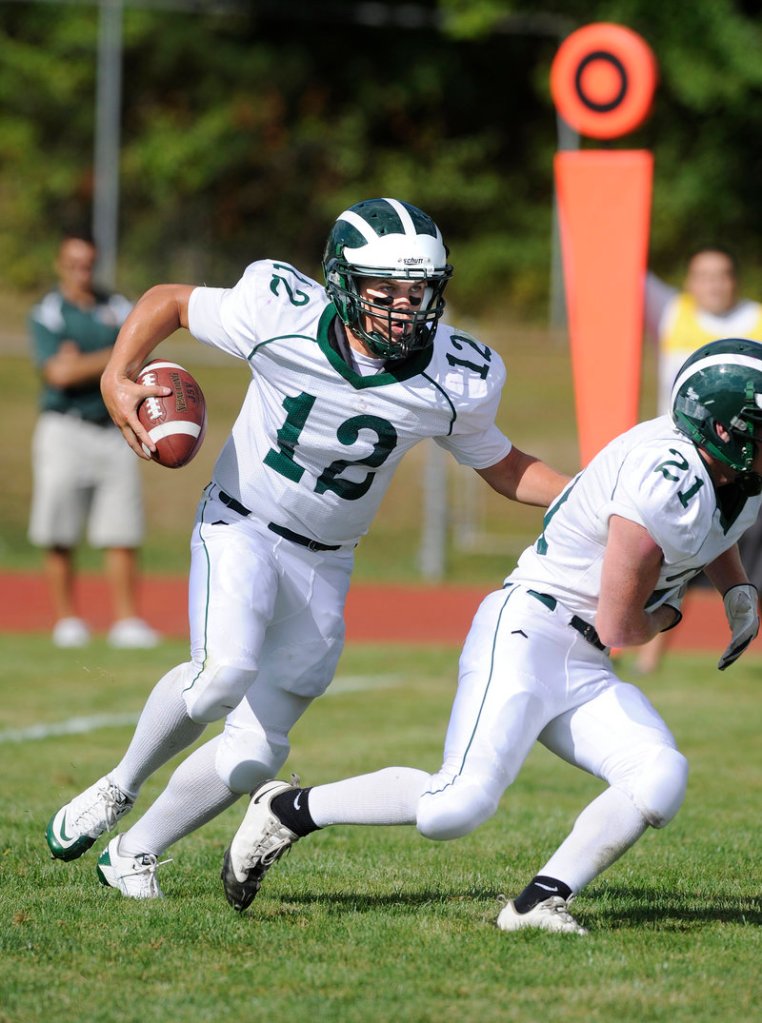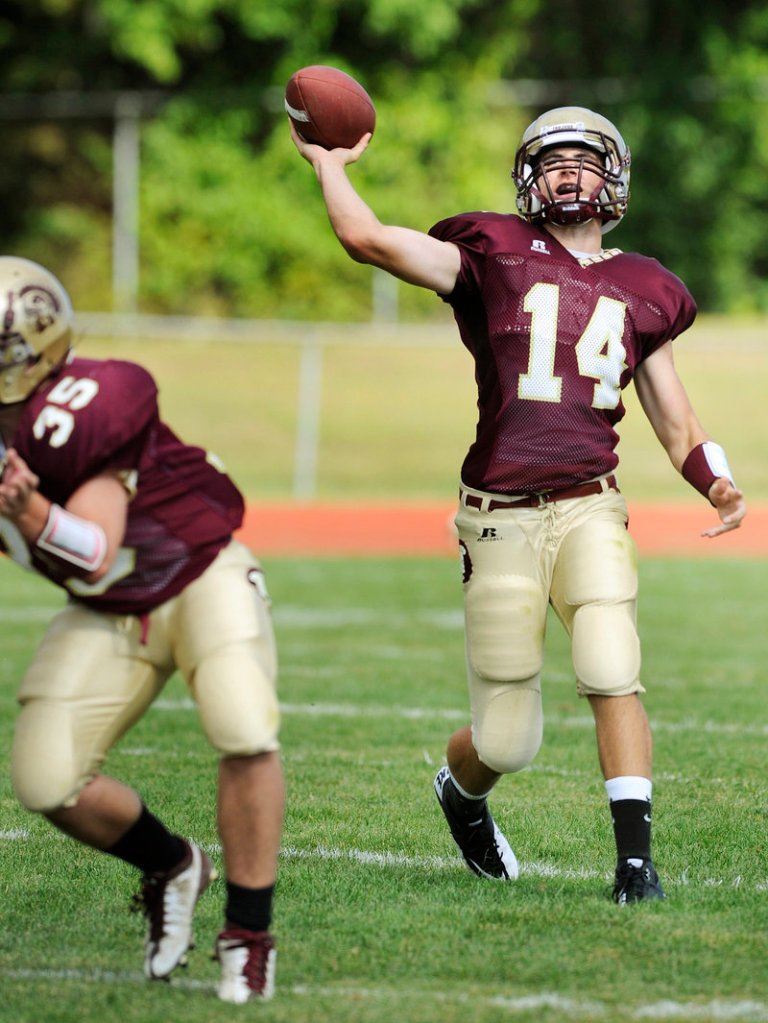The Hunt for Gold November begins tonight, when the high school football season opens across the state. Teams in three classes will take the first step toward winning the coveted Gold Ball.
But the path actually began on the hot Friday nights of the summer, in July.
While many of their friends were enjoying Fridays at the beach, eating Pier fries at Old Orchard Beach or at the movies, football’s skill players — the quarterbacks, running backs, receivers, defensive backs and linebackers — worked on their moves, their timing, their chemistry.
Fridays were seven-on-seven nights, where teams would work on their passing games, both offensively and defensively. They would compete against each other at sites throughout Maine, gaining an appreciation for the intricacies of defending or completing the pass.
“No problem,” said Nate Colpitts, a senior defensive back at Thornton Academy. “We all love the sport of football. We’d give up Friday nights for it.”
Bonny Eagle Coach Kevin Cooper said his players have been participating in seven-on-seven camps for about 10 years, beginning with trips to Bates College in Lewiston. Boston College and the University of Rhode Island also hold camps that attract players from across the nation.
For several years, teams in Western Class A have held their own seven-on-sevens. The schools meet on Fridays at Bonny Eagle in Standish or Thornton Academy in Saco. Twice they get together for all-day sessions, going from 9 a.m. to 3:30 p.m.
The “teams” in seven-on-seven drills don’t include linemen, except for the center on offense. The offensive players run pass patterns, with the quarterback looking for open running backs, tight ends or wide receivers. The defensive players, linebackers and secondary players drop into coverage.
“When you think about the passing game, whether you’re trying to throw it or defend it, there are so many nuances that need to be practiced,” said Cooper. “We don’t have time to do that in Maine, where our team rosters aren’t that big. We don’t play kids on just one side of the ball.
“And we all try to run the ball first, so it’s hard to practice all the little things that go into an effective pass offense and defense. going seven-on-seven in the summer, we can practice those things, and we can do it without the pass rush and pass protection getting in our way.”
Cooper can point to the exact moment when he knew the seven-on-sevens were worthwhile. It came last October in the regional quarterfinals. Trailing upstart Portland, Bonny Eagle faced a fourth-and-13 from midfield late in the fourth quarter, and gained 16 yards on the play.
“We called a pass route that we had run 150 times in the summer,” said Cooper. “And because we had run it so many times, we were able to complete it. That might have been the difference between a championship and turning in our uniforms.”
Everyone gets something out of the practices. Defensive players get to learn how to play a zone. In youth leagues, defensive backs play man-to-man defense. In high school the players have to learn zones. They also see how opposing quarterbacks throw the ball, and get to know the dangerous receivers in the league.
Offensive players work on their timing and chemistry. Quarterbacks learn to read coverages — “Is it man to man? Or zone? Cover 2? Or Cover 3?” — and find the holes in zones.
Josh Woodward, the new quarterback at Thornton Academy, said participating allowed him to see “which players are open, where I’ve got to put the ball. It helped me learn to read defenses.”
“I want to get to the point where I throw the ball before the receiver makes his turn and we’re on point,” said Bonny Eagle senior quarterback Matt Rollins. “We get a chance to work on our chemistry.”
Rollins didn’t start last year so the summer was important for him. It was also important at Scarborough, which not only has a new quarterback (Jack Adams) but a new head coach (Lance Johnson) with a new offensive philosophy.
“We needed the time to get used to the way he throws the ball,” said Joe Viola, a senior wideout for the Red Storm. “And with the new coach and new system we had a lot to take in.”
Johnson, formerly the offensive coordinator at Portland, just likes that his players can work on their routes and coverages without having to worry about anything else.
“The coaches understand that its not ‘real’ football,” he said. “But it’s great for the quarterbacks to see coverages, read coverages and not worry about getting hit. The defenses get to work on coverages and alignments, and get to know the better receivers in the league.”
Even teams that don’t throw the ball much get a lot out of it. John Morin, the head coach at Massabesic in Waterboro, discovered his quarterback, Jake Derochers, last summer.
“It was during the seven-on-sevens that we felt he really started to develop into the quarterback we needed him to be,” said Morin. “For us, with such a run-oriented offense, the summertime gives us the opportunity to work on our pass game because we don’t spend the time we need to spend on it in the season because we’re so focused on the run.
“We use the summer as a teaching situation rather than just going out and running around.”
Of course, linemen are welcome. Mark LaFountain, the coach at Mt. Ararat in Topsham, said whoever showed up for the Eagles would play. His team traveled to Turner for Leavitt High’s seven-on-sevens.
“We’ll bring whoever wants to go,” he said. “Some of the linemen just like to go along and play. They’re tight ends. You need a snapper. If you have 14 to 21 kids, all of them will get reps.
“It’s a great teaching tool for us.”
Beyond that, Mike Bailey, the longtime Portland High coach, believes you discover a lot about individuals during the seven-on-sevens.
“You absolutely find out about individual skills,” he said.
Is this kid fast? Can he catch? Does the quarterback read defenses well? How strong is his arm? Can the linebacker stay with the tight end?
Imadhi Zagon, Portland’s impressive senior back, will run the Bulldogs out of the shotgun in a wildcat formation. He’ll take a direct snap, then decide what to do. He worked diligently on his passing this summer.
“It helped me a lot,” he said. “I’ve got my techniques about halfway down now. But I’m way better at reading coverages now.”
Playing in the summer can elevate a player’s standing on his team.
“It does separate people from one another,” said Scarborough’s Adams. “If you’re working hard in the summer, you’re going to be the one playing on Friday nights.”
Staff Writer Mike Lowe can be contacted at 791-6422 or at:
mlowe@pressherald.com
Send questions/comments to the editors.





Success. Please wait for the page to reload. If the page does not reload within 5 seconds, please refresh the page.
Enter your email and password to access comments.
Hi, to comment on stories you must . This profile is in addition to your subscription and website login.
Already have a commenting profile? .
Invalid username/password.
Please check your email to confirm and complete your registration.
Only subscribers are eligible to post comments. Please subscribe or login first for digital access. Here’s why.
Use the form below to reset your password. When you've submitted your account email, we will send an email with a reset code.